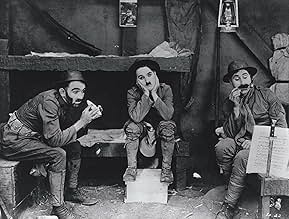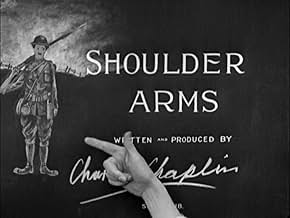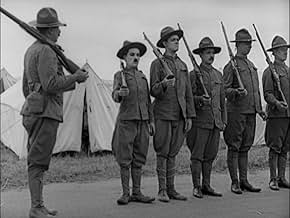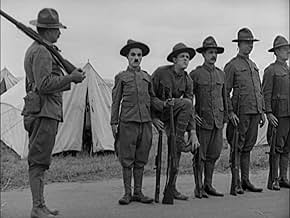NOTE IMDb
7,3/10
7,8 k
MA NOTE
Ajouter une intrigue dans votre langueCharlie is a boot camp private who has a dream of being a hero who goes on a daring mission behind enemy lines.Charlie is a boot camp private who has a dream of being a hero who goes on a daring mission behind enemy lines.Charlie is a boot camp private who has a dream of being a hero who goes on a daring mission behind enemy lines.
- Réalisation
- Scénario
- Casting principal
Charles Chaplin
- Doughboy
- (as Charlie Chaplin)
Syd Chaplin
- Charlie's Comrade
- (as Sydney Chaplin)
- …
W.J. Allen
- Motorcyclist
- (non crédité)
L.A. Blaisdell
- Motorcyclist
- (non crédité)
Alva D. Blake
- U.S. Soldier
- (non crédité)
- …
Cliff Brouwer
- Soldier
- (non crédité)
E. Brucker
- Bit Part in Street Scene
- (non crédité)
F.S. Colby
- Soldier
- (non crédité)
Wellington Cross
- Motorcyclist
- (non crédité)
E.H. Devere
- Bit Part in Street Scene
- (non crédité)
C.L. Dice
- Motorcyclist
- (non crédité)
Avis à la une
Charlie Chaplin wins the war single handedly in this funny amusing film. This was one of Chaplins most successful films and is easy to see why. Made at a time when people needed a diversion from one the most terrifying wars ever Chaplin fins a light hearted way to make people feel good for a while.
The film starts with him having some funny problems in boot camp when he falls a sleep he finds himself being deployed to to trenches of France and immediately has problems manicuring inside the trench, He finally goes over the top rescues a friend, falls in love with a french lady, and then captures the Kaiser.
It is all rather light hearted and very amusing a good film to see
The film starts with him having some funny problems in boot camp when he falls a sleep he finds himself being deployed to to trenches of France and immediately has problems manicuring inside the trench, He finally goes over the top rescues a friend, falls in love with a french lady, and then captures the Kaiser.
It is all rather light hearted and very amusing a good film to see
The big names in cinema tried to do their part for the war effort, and Charlie Chaplin was no exception. This patriotic and propagandist picture, "Shoulder Arms", is part of his contribution, although the war was nearly over by the time of its release. The Tramp goes to the front, humorously accomplishes acts of heroism and kicks the Kaiser in the bum. It's a very funny film, although I don't think it nearly one of his best. It's with "A Dog's Life" as his better output for First National before he made his early masterpiece "The Kid". They were his first three-reelers, which contain sustained, more elaborate gags than he could usually orchestrate in his two-reel shorts at Mutual.
It can be difficult to balance a pro-war message with slapstick antics and scenes of burlesque in battle, but one wouldn't think so watching "Shoulder Arms". It's also preferable in many respects to a "more serious", dramatic work with a similar message, such as Griffith's "Hearts of the World". Chaplin had become a true virtuoso of screen comedy by this time; he makes it look effortless. He knew very well by then that a film with fewer gags--with more elaboration, refinement and careful timing--could be better than any knockabout, Keystone-type farce with a dozen pratfalls a minute. The sequence where Chaplin is disguised as a tree is a pertinent example. Even with wars raging, Chaplin can lift the spirits of millions.
It can be difficult to balance a pro-war message with slapstick antics and scenes of burlesque in battle, but one wouldn't think so watching "Shoulder Arms". It's also preferable in many respects to a "more serious", dramatic work with a similar message, such as Griffith's "Hearts of the World". Chaplin had become a true virtuoso of screen comedy by this time; he makes it look effortless. He knew very well by then that a film with fewer gags--with more elaboration, refinement and careful timing--could be better than any knockabout, Keystone-type farce with a dozen pratfalls a minute. The sequence where Chaplin is disguised as a tree is a pertinent example. Even with wars raging, Chaplin can lift the spirits of millions.
One of Charlie Chaplin's very best shorter features, "Shoulder Arms" is a wonderful combination of comedy, commentary, and adventure. Charlie plays a soldier who heads off to World War I, and in the course of 40 minutes or so, it provides a light-hearted but in many respects believable portrayal of what life was like in the trenches. The story also combines some fine slapstick with some exciting adventures.
In this movie, Chaplin hits the perfect balance between humor and substance, helping us to sympathize with those who bore the burdens of the war, without ever becoming sentimental. The other characters are nicely conceived and acted, with the engaging Edna Purviance, the versatile Syd Chaplin, and other talented supporting players pitching in.
The story has many creative turns, plus a couple of good surprises. It's great entertainment, and thoughtful as well. Make sure to take a look if you enjoy Chaplin or silent comedies in general.
In this movie, Chaplin hits the perfect balance between humor and substance, helping us to sympathize with those who bore the burdens of the war, without ever becoming sentimental. The other characters are nicely conceived and acted, with the engaging Edna Purviance, the versatile Syd Chaplin, and other talented supporting players pitching in.
The story has many creative turns, plus a couple of good surprises. It's great entertainment, and thoughtful as well. Make sure to take a look if you enjoy Chaplin or silent comedies in general.
It's a comedy about the trench warfare just as WWI is about to come to an end. Charlie Chaplin is a doughboy in boot camp. In a series of scenes, he defeats many Germans. Then he wakes up.
It's a pretty long film at 45 minutes. There are some pretty funny scenes. The limburger cheese gag is somewhat weak. Capturing the 13 Germans could have used more slapstick. I do love the part where he's in enemy territories disguised as a tree. The Germans try to chop him down for firewood. That is by far my favorite part. The movie's success probably had a lot to do with the timing and the subject. However I can see the immense risk Chaplin was taking by making a comedy about trench warfare.
It's a pretty long film at 45 minutes. There are some pretty funny scenes. The limburger cheese gag is somewhat weak. Capturing the 13 Germans could have used more slapstick. I do love the part where he's in enemy territories disguised as a tree. The Germans try to chop him down for firewood. That is by far my favorite part. The movie's success probably had a lot to do with the timing and the subject. However I can see the immense risk Chaplin was taking by making a comedy about trench warfare.
Charlie Chaplin's Little Tramp or Little Man character wins World War I, called The Great War at the time, single handedly, even capturing the Kaiser, something the entire Allied armed forces were unable to do. Too bad it all turns out to be a dream, which is somewhat of a cop out and the weakest part of this mesmerizing silent short (almost a feature film at 46 minutes).
There are inventive gags galore including Charlie having to put on a gas mask to eat Limburger cheese sent from home, then using the cheese as a weapon against the Germans; Charlie sleeping underwater in a flooded trench next to a soldier he continues to annoy; Charlie disguising himself as a tree--one of his best sketches ever--and Charlie pretending to beat up his friend who has become a POW, then hugging him when the enemy is out of sight.
One amazing feature is how much Charlie, when he is behind enemy lines dressed as a German, resembles Hitler over ten years before Hitler and his Nazi thugs rose to dominate German politics. Obviously Hitler patterned his appearance after Charlie's from this film.
There are inventive gags galore including Charlie having to put on a gas mask to eat Limburger cheese sent from home, then using the cheese as a weapon against the Germans; Charlie sleeping underwater in a flooded trench next to a soldier he continues to annoy; Charlie disguising himself as a tree--one of his best sketches ever--and Charlie pretending to beat up his friend who has become a POW, then hugging him when the enemy is out of sight.
One amazing feature is how much Charlie, when he is behind enemy lines dressed as a German, resembles Hitler over ten years before Hitler and his Nazi thugs rose to dominate German politics. Obviously Hitler patterned his appearance after Charlie's from this film.
Le saviez-vous
- AnecdotesMany in Hollywood were nervous that one of their most famous peers was going to tackle the subject of WWI. It was released shortly before the Armistice, so it did not help boost national morale, but it did end up as one of Charles Chaplin's most popular films, and it was particularly popular with returning doughboys.
- GaffesIn the woods, where The Doughboy runs to hide from the pursuing Germans, automobiles are visible traveling on a highway on the horizon.
- Crédits fousThe short opens with a title card showing a caricature of Chaplin dressed as a World War I soldier, and text reading "Shoulder Arms Written and Produced by" followed by a blank space. A live action hand appears and points to the title, then the drawing, then uses a piece of white chalk to sign "Charles Chaplin" in the blank space, then points to the caricature one more time.
- ConnexionsEdited into The Chaplin Revue (1959)
Meilleurs choix
Connectez-vous pour évaluer et suivre la liste de favoris afin de recevoir des recommandations personnalisées
Détails
- Date de sortie
- Pays d’origine
- Sites officiels
- Langues
- Aussi connu sous le nom de
- Shoulder Arms
- Lieux de tournage
- 7th Street and Broadway, Downtown, Los Angeles, Californie, États-Unis(traffic cop trouble in front of Bullock's Department Store.)
- Société de production
- Voir plus de crédits d'entreprise sur IMDbPro
- Durée
- 36min
- Couleur
- Mixage
- Rapport de forme
- 1.33 : 1
Contribuer à cette page
Suggérer une modification ou ajouter du contenu manquant



























